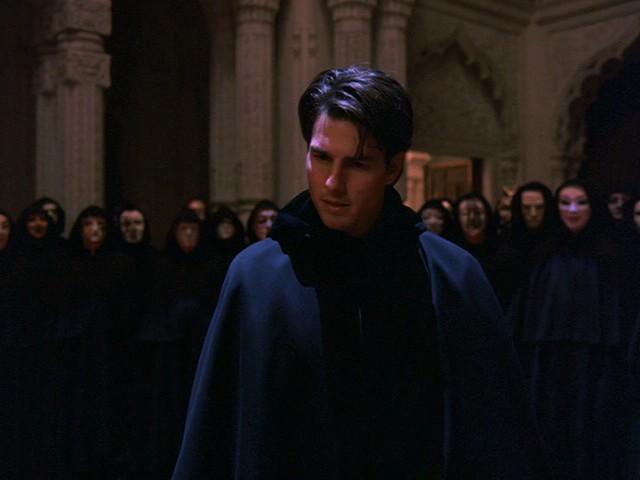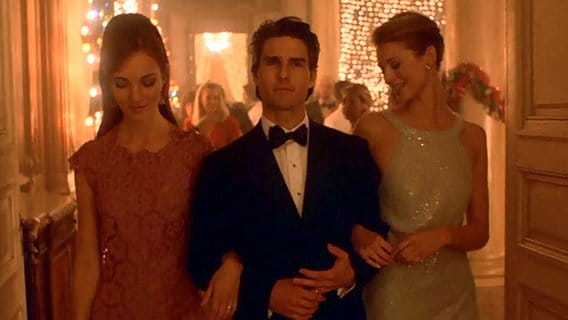Post by StevePulaski on Aug 17, 2017 17:05:43 GMT -5
Eyes Wide Shut (1999)
Directed by: Stanley Kubrick
Directed by: Stanley Kubrick

Dr. Bill Harford is immersed in a world of sexual perversions and transgressions in Eyes Wide Shut.
Rating: ★★★½
Eyes Wide Shut is a film about social transgressions and amorality brought on by wealth, although these are not the only things it's about. At first glance, one might think of it as a film made to arouse and tantalize in the same way a plethora of nineties erotic thrillers did. But Eyes Wide Shut is not Stanley Kubrick's Basic Instinct, and never in its 158 minute runtime does it manage to achieve anything in the way of eroticism. It's a deeply uncomfortable movie; one significantly burdened by unfair hype brought on by magazines like Entertainment Weekly billing it as "the sexiest movie ever" in lieu of its mid-summer release in 1999. If this film was made to be sexy, it might drive a person to become asexual.
The film opens with Dr. Bill Harford (Tom Cruise) and his wife Alice (Nicole Kidman) getting ready to attend their friend Victor Ziegler's (Sydney Pollack) Christmas party. In the opening scene, we learn a lot about Bill and Alice without much small-talk or dialog written for expository purposes. We see they live humbly, in a spacious, yet middle-class, apartment complex in New York despite Bill boasting a PhD. He doesn't seem to be your average doctor, but maybe one making a living through under-the-table deals from wealthy one-percenters that can't afford to wait in emergency rooms or ride in ambulances in a sense that isn't monetary. We also take note of Bill's impersonal relationship with Alice, complimenting how hair looks upon her request for affirmation without even so much as turning to glance at it. This is a marriage that has essentially become two people living together as acquaintances that occasionally have sex, even though they have a young daughter - something that should've brought them closer, according to conventional wisdom.
Upon returning home from the party, frustrated by her husband's mingling with several younger women, Alice confesses to him that, on a recent vacation, she had fantasized about and even contemplated having an affair with a handsome naval officer both met during their stay. This comes after Bill's assertion to his wife that women are indeed more faithful than men, and the revelation from Alice comes shortly after a long monologue by Kidman that showcases great, animated energy that seemingly comes out of nowhere.

Bill proceeds to leave his apartment amidst his wife's confession after receiving a call from a patient's daughter that she has died. He visits her, is partially seduced, but quickly leaves to walk down the seedy streets of New York City. His midnight voyage is marked by the fact that he is often so close to having sex with someone who isn't his wife and kindly declines any romantic services, even after waltzing into a prostitute's apartment and paying her for a service in which he did not partake. Eventually, the night grows old, but before he returns home, he gets an invitation to a private party at a lavish, password-protected mansion by a performer friend (Todd Field) in which he learns that guests must arrive in costume with their faces obscured by masks. Bill then begs a costume rental store to open up its doors after closing to purchase a costume at an inflated rate in order to attend what he realizes is a cult-like ritual featuring group-sex, orgies, and abuse.
It's understandable to think that sex is the primary theme in Eyes Wide Shut, but the important thing to note is the commodification of the intimate act to make it a cold exchange perpetuated as a tactic discerning wealth and status. The intercourse and nudity that's infrequently shown is clinical and decorous, the way Bill claims to Alice the female body is to him when he is dealing with a patient. Before arriving at the mansion, Bill exchanges cash freely, bidding against himself in instances such as begging the costume-shop owner to open his doors and going as far as to rip a $100 bill in half as a way of giving the cabbie a deposit in order to wait for him to leave. He also uses money as a tool of sympathy, forking it over to a red-haired prostitute in her cramped apartment as a token of apology and a compensation for using her time. It isn't until Bill arrives at the mansion that he realizes that he's no longer in control; people with more money and more power are and the shocked look that glazes his unmasked face after realizes he's been taken advantage of that night; like a prostitute or the costume-shop owner's young daughter, who is seen with two men in the dead of night.

As such, women are commodified in a way that holds their beauty in conjunction with their price. Alice is rarely in a scene where her beauty isn't mentioned or her aura isn't complimented; the prostitutes all have set prices, and certainly the women at the mansion are not free to be enjoyed by whomever wherever. Embedded in a story ostensibly about sex and erotic tendencies is a very material, fetishistic worship of the almighty dollar that is shared by a collectively wealthy group but also emboldened by our lead character. Bill and Alice seem like the archetypal "good people" until we come to realize that Bill can't have a simple conversation without dying it back to monetary terms and Alice is victim to the effect she has on leering men. The objectification of everything is just a little more than gross.
Eyes Wide Shut also takes place during Christmas, a time when money triumphs the real spirit of the holiday, and even Bill and Alice's daughter finds herself taken by the pursuit of toys, desiring almost every one she walks past in the film's final scene. It's no coincidence that the moody city streets are lit by the fluorescent hues of Christmas trees and neon-signs are blindingly present in nearly every scene that takes place outdoors. All is present to remind of a happy time, yet all of it does its part to remind people that it's the most positive time of the year to show how much you love your family and children by flaunting the size of your wallet - something Bill hardly needs to do more than he already does but does well nonetheless.
Co-writer (alongside Frederic Raphael), producer, and director Stanley Kubrick died just six days after showing what was said to be the final print of Eyes Wide Shut to Warner Bros., which partially contributes to the reason it took Kubrick's swansong to be given the respect and credit is more than deserves. Released in the summer alongside South Park: Bigger, Longer & Uncut and American Pie while featuring two actors who were staples of tabloid trash at the time, Eyes Wide Shut was anticipated by the mainstream public as a film that would feed their insatiable desire to see two attractive actors being simultaneously attractive and commanding in a film cultivated to be the social event of the season. Kubrick's death made it impossible to defend the film or redirect the initial, misguided criticism from critics billing him as a hack director of an empty movie and audience's disregard for adapting to something so unexpected and different.
Rather than standing out, amazingly so, Tom Cruise and Nicole Kidman blend into their backgrounds and dissolve from the ubiquitous media presences we've come to know them as. During the film's release, it must have been remarkable to watch these two actors practically disappear, not because of lackluster performances, on the contrary, because the moral degradation and ugly environments swallow them whole. Cruise, an actor I've never particularly been sold on outside of a few standout performance, immerses himself into a role, and Kidman, while not being the focus of the story or the events in the film as often as I would've liked, still finds ways to arrest even outside of her incredible monologue. It would be interesting to see an approach to the story that swaps Bill with Alice and the respectable genders of prostitutes and other side-characters in order to see how Alice handles the emotional sensory overload her husband experiences throughout the entire night.

Some have remarked that Kubrick's characters carry a sort of hollowness to them, which I find true but purposeful (rarely, if at any point, in a Kubrick film could you point at something and say it likely wasn't intentional). On that note, consider the moment inside the prostitute's apartment where Bill receives a phone-call from a concerned Alice asking him how much longer he will be before he comes home. As Bill whispers a lie into the phone, a book-title appears clear as day to the audience as it belongs to a lofty anthology called Introducing Sociology; that alone suggests it's not the psychology or ulterior motives to the characters with which we should be concerned, but the groups to which the characters belong. The aforementioned scene plays like a good lesson in sociology too; prostitution is one of the most defining, anomalous transactions of our world. It contributes to the breakdown of marriage yet can also facilitate its longevity.
Through slowburn, Kubrickian pacing, beautiful tracking shots, and themes, tones, and connections that loan themselves to analysis for years to come, Eyes Wide Shut is a brilliant way to end a brilliant filmmaker's career, solidifying legacy while mesmerizing with depth and complexity brought to a story that's as compelling as basic training or illustrated mental illness.
Starring: Tom Cruise, Nicole Kidman, Sydney Pollack, Marie Richardson, and Tim Field. Directed by: Stanley Kubrick.

